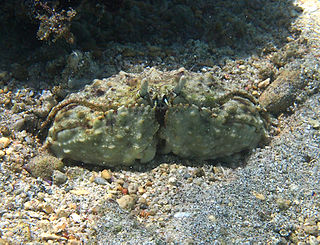
Cancer is a genus of marine crabs in the family Cancridae. It includes eight extant species and three extinct species, including familiar crabs of the littoral zone, such as the European edible crab, the Jonah crab and the red rock crab. It is thought to have evolved from related genera in the Pacific Ocean in the Miocene.

Calappa is a genus of crabs known commonly as box crabs or shame-faced crabs. The name box crab comes from their distinctly bulky carapace, and the name shame-faced is from anthropomorphising the way the crab's chelae (claws) fold up and cover its face, as if it were hiding its face in shame.

Portunidae is a family of crabs which contains the swimming crabs. Its members include many well-known shoreline crabs, such as the blue crab and velvet crab. Two genera in the family are contrastingly named Scylla and Charybdis; the former contains the economically important species black crab and Scylla paramamosain.

Macrophthalmus is a genus of crabs which are widespread across the Indo-Pacific. It contains the following species : Species in this genus are often referred to as sentinel crabs.

Cancridae is a family of crabs. It comprises six extant genera, and ten exclusively fossil genera, in two subfamilies:

Potamonautidae is a family of freshwater crabs endemic to Africa, including the islands of Madagascar, the Seychelles, Zanzibar, Mafia, Pemba, Bioko, São Tomé, Príncipe and Sherbro Island. It comprises 18 extant genera and 138 extant species. Fossil remains dating from the Late Miocene period have been attributed to the family Potamonautidae.

The Varunidae are a family of thoracotrematan crabs. The delimitation of this family, part of the taxonomically confusing Grapsoidea, is undergoing revision. For a long time, they were placed at the rank of subfamily in the Grapsidae, but they appear to be closest to Macropthalmus and the Mictyridae, which are usually placed in the Ocypodoidea. It may thus be better to merge the latter superfamily with the Grapsoidea, retaining the latter name as it is older.
Etyiidae is a prehistoric family of dromiacean crabs only known from Cretaceous and a few Paleocene fossils.

Carpilioidea is a superfamily of crabs containing a single extant family, Carpiliidae and three extinct families. The modern range of the family includes the Indo-Pacific, Western Atlantic and Caribbean Sea. The fossil record of the group extends back at least as far as the Paleocene.

Hexapodidae is a family of crabs, the only family in the superfamily Hexapodoidea. It has traditionally been treated as a subfamily of the family Goneplacidae, and was originally described as a subfamily of Pinnotheridae. Its members can be distinguished from all other true crabs by the reduction of the thorax, such that only seven sternites are exposed, and only four pairs of pereiopods are present. Not counting the enlarged pair of claws, this leaves only six walking legs, from which the type genus Hexapus, and therefore the whole family, takes its name. Some anomuran "crabs", such as porcelain crabs and king crabs also have only four visible pairs of legs. With the exception of Stevea williamsi, from Mexico, all the extant members are found either in the Indo-Pacific oceans, or around the coast of Africa.

Pilumnoidea is a superfamily of crabs, whose members were previously included in the Xanthoidea. The three families are unified by the free articulation of all the segments of the male crab's abdomen and by the form of the gonopods. The earliest fossils assigned to this group are of Eocene age.

Actumnus is a genus of crabs in the family Pilumnidae. Alongside the 28 extant species, it has a fossil record extending back into the Miocene.

Palicoidea is a superfamily of crabs, comprising the two families Crossotonotidae and Palicidae. Together, they contain 13 genera, including two genera in the Palicidae known only from fossils. The two families were previously treated as two subfamilies in a Palicidae of wider circumscription.

Leucosiidae is a family of crabs containing three subfamilies and a number of genera incertae sedis:

Paraxanthias is a genus of crabs in the family Xanthidae, containing one exclusively fossil species and the following extant species:

Xanthias is a genus of crabs in the family Xanthidae, containing two exclusively fossil species and the following extant species:

Atergatis is a genus of crabs in the family Xanthidae, containing the following species:

Zosimus is a genus of crabs in the family Xanthidae, containing the following species:

Dynomenidae is a family of crabs in the superfamily Dromioidea mostly found in Madagascar. There are nineteen genera in this family: five extant and fourteen known from fossils:


















